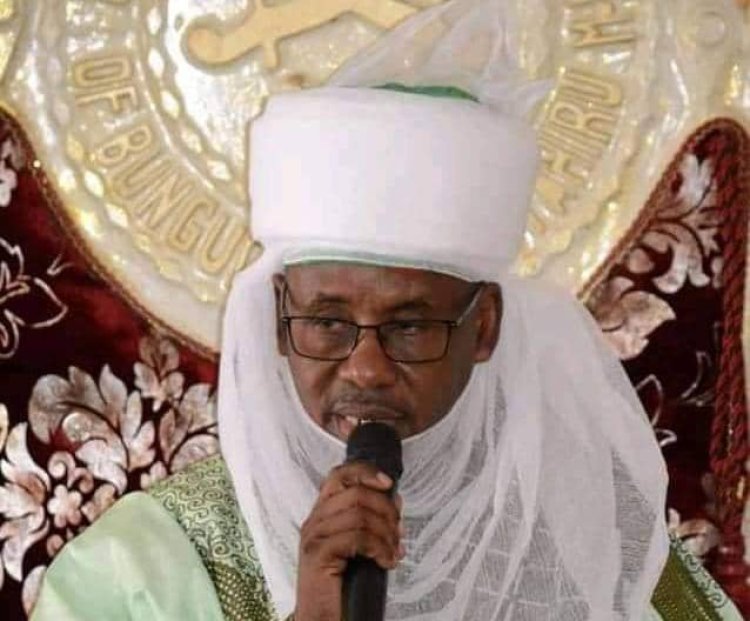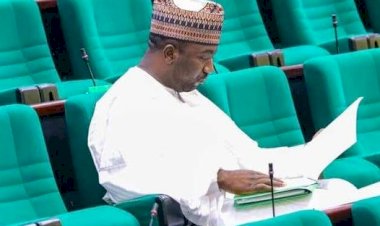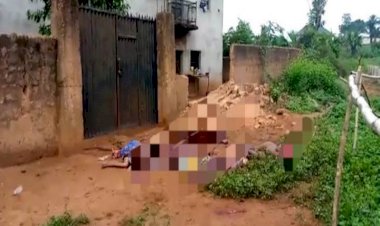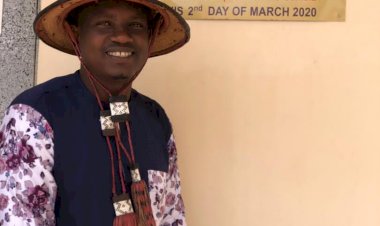How I Was Abducted, Spent A Month In Kidnappers’ Den – Zamfara Emir
The Emir of Bungudu in Zamfara State, Alhaji Hassan Attahiru, was abducted by kidnappers along the Kaduna-Abuja road last year....

The Emir of Bungudu in Zamfara State, Alhaji Hassan Attahiru, was abducted by kidnappers along the Kaduna-Abuja road last year. He spent 32 days in custody. In this exclusive interview with Daily Trust Saturday he reminiscences on the experience and proffers solution to the banditry problem.
How did this problem of banditry that is now everywhere start in your domain and Zamfara in general?
The problem of banditry in Zamfara State started with attacks on Fulani communities; and reprisals were also made.
But a lot of times, when Fulani or herders’ communities (not all the herders are Fulani) were attacked, they had nobody to protect them or even anywhere to lay their complaints. That is why they had no option than to seek a way of taking revenge.
In most cases, it is where revenge was taken that news was made, and because of the nature of those they took revenge on, especially in more densely populated areas, you had collateral damage along the line. They knew who they were going to attack, but others who came in contact in the line of fire or so were also affected.
That’s what happened from the beginning, on a small scale until it grew to a larger scale, where more people were involved from both sides and more vicious attacks were done. To our understanding, that’s how it started.
I remember there was a time, at the beginning in my domain before I assumed the throne, my predecessor always warned communities against reprisals. When they were reporting it to the traditional authorities and others, things didn’t get as bad as they are now. That is one aspect. The second aspect is the involvement of foreign herders in our communities. Foreign herders came as far as Guinea and Mali into this area. They had the culture of violence, which they introduced to our communities.
Thirdly, some of our youths went to the South, got into some bad habits, came back and introduced it to our communities.
To my understanding, these are some of the things that brought about these attacks.
There is also the issue of failure of leadership amongst us. There is the failure of not effectively addressing the issues in a multifaceted and all-inclusive manner. I think that issue is persisting.
I think the issue of foreign herders has been controlled, to a large extent. However, in the last few months we have been seeing some of them coming in, and we have
been reporting them accordingly. That is my understanding of the issue.
Some of you traditional authorities are accused of exploitation, which contributed to this problem; what do you say to this?
If you are talking about the involvement or exploitation of the situation by traditional leaders, it became bad not more than 11 or 12 years ago; prior to that, things were going on well. And the authority of traditional rulers was eroded since 1976.
But it is said that for years, traditional rulers have been exploiting the situation.
The issue of exploitation by traditional rulers is not done in isolation. A lot of these things were done with politicians and government officials. In most cases, the role of traditional rulers was only symbolic; maybe some of them took advantage of what the other ones were doing to gain from their situation.
But I assure you that prior to when traditional rulers had authority, it wasn’t like that. They held all the herders and other communities in high esteem because the institution benefitted from peace and tranquility, as well as the growth and prosperity among these people.
On the issue of traditional rulers exploiting the situation, wherever there are people, there are always bad eggs. Substantially, I think the role of traditional rulers in making the situation as bad as it is, as far as what I am seeing, is largely minimal.
In the last 11 or 12 years that this violence has become almost uncontrollable, how has it affected the people in this domain?
Without any fear of contradiction, our people’s source of income has diminished by more than 80 per cent because the area affected by this insecurity is the heart of prosperity in my domain.
We have at least 80 per cent of where food is grown and where herders operated peacefully in those days. We have at least 80 per cent of them that have been affected in almost absolute terms, whereby they could hardly do anything.
If they cooperated with some of the bandits and were able to grow, they could barely get what they could feed themselves and their families with.
You could say the lifeline of our people has been rearing of livestock and farming, so, as long as that has been affected, certainly, you know we have been affected. I am not counting the countless lives. Nobody can give a figure of the people who have been killed or displaced because no serious assessment has been done.
How do you feel as a leader seeing the devastation caused by this violence on the people?
Certainly, it is heartbreaking, to say the least. It is not only that we are always exposed to insecurity, our bond with our people has been a very strong one. By the time you hear that a place has been attacked, it is a place and people you know and have related with. There are not stories. It is worrisome. The sorrow we feel and emotional situation people have been pushed into cannot really be adequately explained.
You have been battling this problem at home, then suddenly, on the highway your convoy was stopped and you were abducted; how did you feel on that day?
Anybody who knows what is happening in the country, especially in the area where I became a victim, knows that it could happen to anybody. When it happened, of course there must be the initial shock, but along the line, I lived with the situation.
I must admit that I only got some courage from the Almighty. I am sure it is thanks to the prayers that a lot of people had been doing for me that I was able to have control of myself. Throughout the period of captivity, I don’t think there was a day I knew the feeling of stress.
I was telling some of my people that the fear and worry they were put into were more than what I was feeling. And it was understandable because I was in a certain situation and you people were in an uncertain situation. So I wasn’t surprised.
Can you recall how it happened?
Like everybody else has been explaining, you were on your way and suddenly, people started shooting and your driver tried to maneuver, but others came from behind and attacked and picked up people, killed a couple of others and took you into the bush, walked for about two days, then you were taken to their camp. I spent 30 days in their camp, apart from the two days we used in walking to that place. And it was during the rainy season, so it was raining day and night. That was why I said the strength some of us had must have only come from God. I was not the only person, there were few others, including young women in my group. We all went through; thanks to God.
How was the camp where they kept you; was it an open field or like a village?
It was an open field.
Did they keep people in some huts?
I wouldn’t want to compromise some situations, so I wouldn’t want to go into very deep specifics, but it was an open place. They had the advantage of maybe hearing and seeing people from there. The people who kept watch over their victims were different from those who
went for operations.
These are young and illiterate people who were into drugs and other things. Those who were a little bit older were the ones who would go and scavenge for victims.
How did it feel facing uncertainty, especially because this could turn either way for you if there was an attempt to rescue you?
It is thanks to the Almighty Allah that things went well. I don’t know how we got the courage, but I really had faith that God had ordained whatever was going to happen, so I didn’t get much bothered.
I didn’t have time to think, but I was always praying and hoping for the best. I was also encouraging those who were with me. There were a couple of young people and a lot of people from the surrounding villages who were captured and brought there. I tried to encourage people to always have faith in God. So I didn’t have much worry while I was there.
Were your captors Fulani?
Substantially, they were Fulani from Nigeria and some from neighbouring countries. I knew that some of them were from Niger. Some of them even had training outside the country because the way they were speaking, they were Fulani of all dialects. We had somebody who understood Fulfulde very well, so he used to tell us the difference among dialects because our knowledge of the language was very small. Of course there were others from the surrounding villages, who they conquered and recruited into their activities.
What was their motivation; did they speak of any agenda or religion?
Certainly, there was no religious agenda. To me, it has turned out to be purely criminal, but what drove them into it could be something else. Many of them were driven into it because they lost all their means of livelihood and became victims of torture by security agencies, some of them for crimes they committed, others without committing any crime. According to them, they lost everything they had, so they had no option than to go into the bush and engage in crime. But it has passed that stage.
Do you think some religious organisations may have trained them?
I don’t have any reason to believe that, but of course there were talks amongst them of people from Boko Haram coming and allowing them to work with them.
While we were there, they were mourning one of their leaders, who they said was killed by the Boko Haram group. That was the much I could hear about an incident of religion.
The issue of vigilante has been on for a while, I mean the Yan-sa-kai; do you think it is a solution or a factor actually fueling the crisis?
There has to be a very comprehensive approach to solve this situation. Each group you bring out has its own ills; we have bad eggs from all areas. Just like traditional rulers, the Yan-sa-kai also has bad eggs; even security agents have bad eggs. So there has to be a comprehensive collaboration so that we can utilise every strength we have.
Certainly, there is a role the Yan-sa-kai could play. There are also those we call Yan banga. Those in Yan-sa-kai are largely on their own; they normally don’t even listen to us, but we have some level of control over the Yan banga.
We have traditional artisans, the Entori, the other people who had their way among the community that could be used. So there really has to be full concentration to face this menace.
I always plead that all the potentials we have are utilised so that this problem could be solved. Of course I am not only talking about attacking and finishing the bandits, there is a social approach that has to be taken.
We have lost our farmlands and herding environment. And these were places that employed millions of people, apart from other benefits.
We need to find a way of restoring these things. And that is the only thing that will make people go back and have a legitimate means of livelihood instead of engaging in banditry.
It is not going to be easy, but I assure you that if there is effective synergy among all the concerned people, I am sure we can solve this problem in no distant future.
Are there some bandits that should be given an opportunity to repent?
Of course, opportunity should be given to any criminal who wants to become a good person. If we don’t do that we are even negating what the Almighty has ordered us to do. But it has to be done in a very controlled manner. If anybody wants to repent, what is he going to do? Where are the weapons he had? Where is his family? Where was he staying before joining banditry? What was he doing? And how would he integrate?
This is because it should be total repentance. A lot of them had places they were living with their families and doing some vocations. As long as we do that, it would go a long way in solving the situation, but we have to be very cautious about that.
In summary, what would you say we should do to get out of this problem?
There are so many things. Although there is no easy way, largely, we have to really look backwards and inwards. How were we living before now? Who was where and doing what? How do we restore our means of livelihood?
We really have to look back, use traditional rulers and others and see how much we could recover about what had been sustaining people.
Some of the people in the bush really had no formal education, so we have to look at how we could integrate them and give them some education. By the time we continue doing that, then within some time I think we should be able to solve the situation.
And there is this issue of people in privileged positions that are involved in economic gains. I think they should face the law because as long as people are taking part in these things and they are left unpunished, certainly we will not see the end of this. We have to take action, whether they are traditional rulers, security agents, politicians or government employees. Anybody caught should face the law.
Source Daily trust


















































